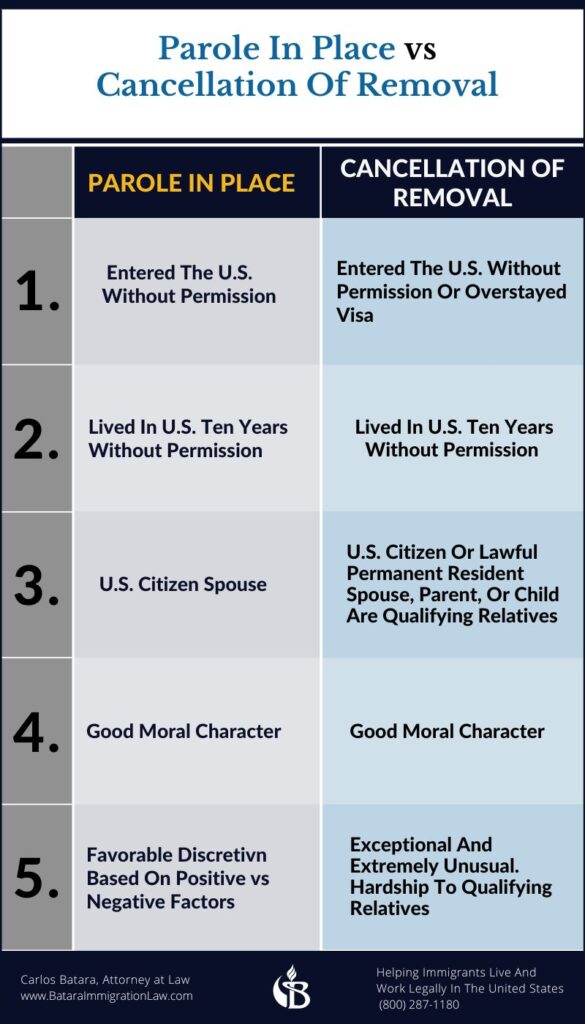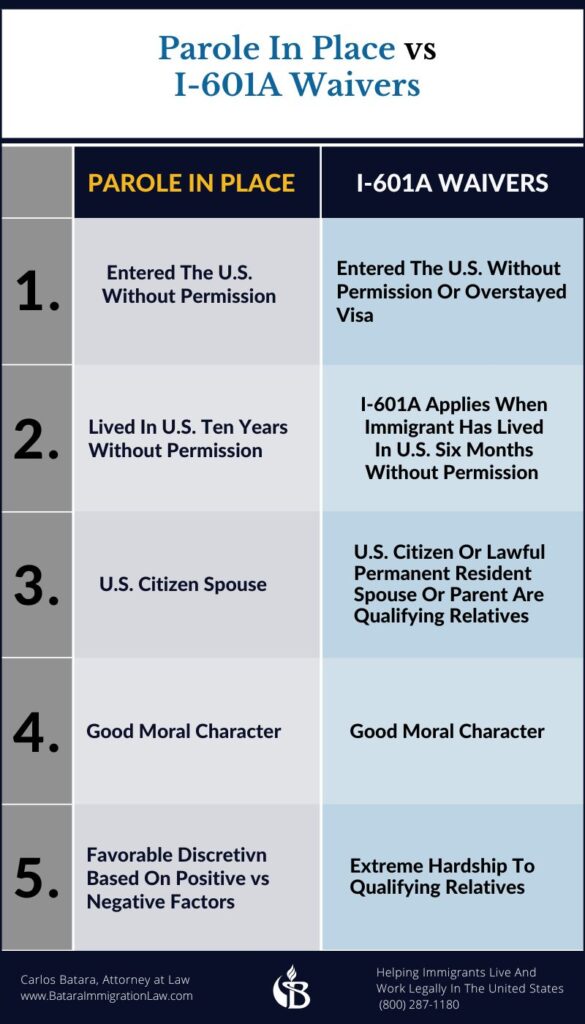
For many immigrants, immigration law is an incessant roller coast ride.
Especially over the past three decades, many of those married to U.S. citizens have suffered emotional highs followed by emotional lows, time and time again.
At long last, on mid-June 2024, a green card panacea for such families seemed to be just around the horizon. Yet, the Biden Administration’s Parole In Place plan, entitled “Process To Promote The Unity And Stability of Families”, was struck down by a federal court less than five months later.
The sad truism that there are no quick immigration fixes once more rang loud and clear.
Understanding Permanent Residence Options After The Death Of Parole In Place
“What’s next?” was the response of undocumented immigrants and their U.S. citizen spouses when Parole In Place program was defeated in court.
By assessing the primary five parole requirements, two possibilities emerge. For if an immigrant spouse, married to a U.S. citizen, would have qualified for the administration’s parole proposal, they are strong candidates for Cancellation Of Removal or I-601A Waiver success.
In short, the key requirements for the two options match favorably with the major provisions of the Biden parole proposal.
When immigrants applied for parole status, to be successful, they needed to meet all the program requirements with relevant evidence.
Here is a quick recap:
Undocumented Status: The immigrant must have arrived in the United States without permission.
Ten-Year Residency: The immigrant must have lived in the United States for ten consecutive years prior to June 17, 2024.
Marriage To U.S. Citizen: The immigration spouse had to be legally married to a U.S. citizen as of June 17, 2024.
Good Moral Character: A showing of good moral character had to demonstrated. Some convictions would have led to the denial of parole applications. The disqualifying criminal conviction rules under Parole In Place were set at more stringent levels than those under the Cancellation Of Removal or I-601A standards.
Favorable Discretion: The immigrant spouse had to prove he or she merited a favorable exercise of discretion. This meant that beyond criminal convictions, positive and negative factors supporting the immigrant’s request to remain in the United States would be weighed against each other. If the positive factors outweighed the negative factors, parole would be granted.
Assuming applicants would have met the above requirements, let’s now look at how closely-related Cancellation Of Removal and I-601A Waiver provisions might now help immigrant families.
Parole In Place vs Cancellation Of Removal

Option 1: Cancellation Of Removal At Immigration Court
This option occurs only in immigration court and acts as a defensive “last chance” strategy against deportation. Here is how Cancellation Of Removal rules align vis-a-vis Parole in Place requirements:
- Undocumented Status: Just like Parole in Place, the Cancellation Of Removal rules for undocumented immigrants under INA 240A(b) allows undocumented immigrants to seek relief.
- Ten-Year Residency: Under Cancellation of Removal, ten years of continuous residence in the U.S. is necessary to prove. Thus, the ten years residency requirement e showing you’ll start counting your ten years from the day you’re served with a notice to appear in court.
- Marriage: Cancellation Of Removal requires an immigrant to have a qualifying relative who would suffer extreme hardship. A U.S. citizen spouse is a qualifying relative. under this requirement.
- Good Moral Character: All immigration programs mandate good moral character. Because the Parole in Place’s criminal provisions were seemingly more stringent than counterpart rules under Cancellation Of Removal, PIP applicants should be able to meet this hurdle.
- Favorable Discretion: Under Cancellation Of Removal, an applicant must be able to demonstrate exceptional and extremely unusual hardship to a qualifying relative. So what types of factors are considered? In essence, the same type of issues weighed under a good merits – bad merits analysis.
Parole In Place vs I-601A Waivers

Option 2: Consular Processing With A Waiver Of Unlawful Presence
The second option involves filing an I-601A waiver. This requires the immigrant to return to their home country for an interview but allows them to re-enter the U.S. legally if the waiver and the green card applications are approved. The waiver provisions, like those of Cancellation Of Removal, closely aligns with the Parole in Place requirements:
- Undocumented Status: Similar to Cancellation Of Removal, those who entered the U.S. without inspection places many immigrants into the category of those who must filed an I-601A waiver in order to obtain green card status.
- Ten-Year Residency: There is no ten-year requirement for the I-601A waiver. Rather, if an undocumented immigrant has lived in the U.S. without permission for more than six months, he must attend his interview for permanent residence abroad. To return lawfully, an I-601A waiver must be granted.
- Marriage: Like Cancellation Of Removal cases, applicants for waivers must show hardship to a qualifying relative. U.S. spouses are deemed qualifying relatives.
- Good Moral Character: As noted above, demonstrating good moral character is an absolute rule. The Parole In Place criminal conviction provisions are, on the whole, more rigid than I-601A disqualifying crime requirements.
- Favorable Discretion: The hardship requirement for I-601A Waivers is that the immigrant must show extreme hardship will be suffered (whereas in Cancellation Or Removal the rule is exceptional and extremely unusual hardship). Both standards for hardship focus on evidence highly similar to factors which underlie showing good merits for a favorable USCIS discretionary evaluation.
To be sure, the good merits-bad merits assessment is different than a hardship analysis. But the issues under review for one, however, is largely similar to the issues involved in other – even though the emphasis on the two approaches are dissimilar.
Parole In Place May Be Over –
But Not Your Green Card Dreams
Had the Parole In Place program been hatched in the early days of the Biden Administration, it might have survived legal challenge. Instead, it was an 11th hour announcement. Being not released until the closing months of the presidential election causes one to question the real intentions of the Biden proclamation.
Unfortunately, Like a bride left hanging at the green card altar, immigrants must regroup and move forward, despite the internal pain of rejection.
Immigrants and their families have been forced to pivot again – and to regain the fortitude to survive the constant worries of detention and deportation.
In my view, given the primary five requirements of the defunct Parole In Place proposal, two potential solutions exist for undocumented immigrants. Neither offers an immediate solution or a direct pathway to permanent residence.
Nonetheless, both provide a mechanism to keep their immigrants, their spouses, and children intact as a family unit in the United States.
By Carlos Batara, Immigration Law, Policy, And Politics




